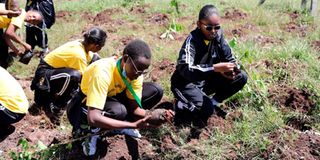Why climate education is essential for Kenya’s future

Apostolic Camel Girls High School students plant trees in Ngong Forest, Kajiado County, on June 5, 2022.
The climate crisis is one of our generation’s most pressing issues. Despite Africa accounting for only 2-3 per cent of the global greenhouse gas emissions, the continent bears the outsized impact of climate change as it faces a surge in droughts and floods all of which contribute to an increasing poverty index over time.
At the onset of Covid-19 in 2020, over 40 million Africans were pushed to extreme poverty and the region experienced its first recession in 25 years.
With the climate change impacts, education has a key role in imparting relevant knowledge, skills and competences to address the crisis. Understanding its causes and impacts is the first step towards shifting mindsets, exploring ways of mitigating its effects and adapting to its unavoidable consequences.
Climate change has an impact on our education system. Student enrolment is low in parts of sub-Saharan Africa severely affected by harsh environmental changes. Failure to satisfy basic needs such as food, shelter and clean water is a leading cause. Due to disputes over pasture and water, students from nomadic communities can’t go to school.
Global warming
Children have the capacity to grasp and internalise the implications of global warming and contribute to climate action early. Kenya has made strides in its education system with the free primary, subsidised secondary and tertiary learning. But since climate change has not been adequately mainstreamed into the curriculum, developing relevant knowledge and abilities to adapt to it is a challenge.
In 2010, the government launched the National Climate Change Response Strategy, which enhanced the understanding of climate change addressing its concerns on communication, education and awareness. It also developed the Climate Change Act 2016, which provides guidance and priority actions on addressing climate change, taking into consideration the Kenya Vision 2030 and global goals.
In May last year, the Environment ministry, in partnership with that of Education, recognised that there was a significant emissions gap between the Paris Agreement’s aspirational objectives and real-world commitments and actions. They developed guidelines for mainstreaming of climate change in curricular at all levels of education and training.
Environmental clubs
There is a growing interest amongst companies in establishing and supporting environmental clubs across schools. Through the clubs, students have an opportunity to gain knowledge and skills needed to support climate adaptation projects and innovations necessary for the Kenyan ecosystem.
Lastly, with the World Environmental Day having been marked yesterday, we should recognise that we only have one earth and that nature is at the core of development and a powerful enabler of achieving the 2030 Agenda for Sustainable Development. It is time stakeholders invested more efforts in creating a sustainable society for the future generations.
Ms Njino is the Executive Director of Global Compact Network Kenya. [email protected].




